#not because she thinks they’re gay in the 1930s or anything she wouldn’t care about that
Explore tagged Tumblr posts
Text
“jarthur angst” this and “kayne doesn’t keep his promise” that. no. post s5 au where they’re all happy. john gets his own body and faroe is back and they’re happy and it works out. john and arthur start working as private detectives and they’re raising faroe together and everything is fine. do i have to write a fanfic because i’ll write a fanfic
#i have writer skills and i will use them for evil (wholesome fluff fic)#kayne is like#faroes weird uncle in this au#like she has her dad and her vaguely eldritch dad and her eldritch uncle#arthur can see in this au#because i said so#i’ll bring bella back#threat#they’ll be friends because they didn’t want to be married in the first place#bella’s weirded out but supportive of whatever john and arthur have going on#not because she thinks they’re gay in the 1930s or anything she wouldn’t care about that#it’s just that john seems vaguely Off and she can’t place it#malevolent#arthur lester#john doe malevolent#malevolent spoilers#kind of?#malevolent fluff fic
48 notes
·
View notes
Text
How Nico Comes Out to Hazel Because I’m Supposed to Be Doing Homework and I Don’t Want To
Okay I saw this post on Pinterest post of all places about how Nico would definitely have told Hazel about what happened with Eros in HoH and that he actually would have told her about his being gay before coming out to Percy & Annabeth
But I don’t think he would do that, and here’s why:
Hazel and Nico are both from the 1930s-1940s
Obviously, considering that time period, being gay or poc or just DIFFERENT in general was weird and very looked down upon
So I’m gonna go ahead and say that Nico did not want to tell Hazel at all when he met her
Why?
Let’s think about it.
Since Bianca, Nico’s been alone for a long time. But now he’s just found out about a new sister, which gives him a new chance to make a friend and be a little less lonely
Knowing that she’s from the 1930s, he probably WOULD NOT AT ALL want her to know that he’s gay because he’s got a lot at stake: if he told her, there’s a chance she’d shun him for it, which means he’d no longer have a sister. he’d be truly alone.
so, in his mind, it would probably be safer to just... see where his relationship with her went. he wouldn’t want to risk anything.
After thinking about this, I actually think Hazel would be one of the later people he’d tell. So now here’s an HC about how he DOES come out to her:
I think maybe before Hazel leaves for CHB, or maybe just some time before the communication goes down, Nico decides to tell her
They’re in his cabin, and he’s super scared (because he knows she might not take it the best way)
He says, “Hazel... I like................ men”
and now Hazel’s just like “whaT?????”
so she’s super surprised and, honestly, she’s really not sure what to do with that information
she’s about to say something, she doesn’t really know what she’s going to say but she’s about to say SOMETHING, maybe express her shock... but then she sees Nico’s face, and how pained it looks, and it just hits her: he’s in pain. he’s in pain because he told her.
so she doesn’t really know WHAT to say anymore. but she understands this was probably super difficult for him to say.
so instead, she just says, “who else have you told?” and Nico tells her Jason and Reyna know
she says “...i think.... i think i need to think about this, Nico...” and she leaves
and Nico’s like “okay take your time” because he knows that, as another child from the 1930s, this is A LOT to take in
but when she leaves, he just like.. closes all the blinds in his cabin so no light comes in and he climbs into his bed and like just lays there and cries because I WAS SO STUPID IT WAS TOO SOON SHES GOING TO FUCKING HATE ME
really, though, Hazel probaly goes to Jason to talk about it
when she tells him what Nico told her, Jason sits her down
and he’s like “how do you feel?”
and she’s like “idk.. it’s just... i dont know. i dont know.”
and he nods, because he knows it must be strange for her to think about this stuff because, again, she’s from the 1930s and things were WAY DIFFERENT back then
he says, “hazel, i know it’s weird for you. this kinda stuff isn’t something you saw back then. but listen, we’re in a different century now. things are different. while we still have issues, we’re a little more accepting as a society.”
“think about this: would you rather shun your only living relative, who also happens to know what you’re going through with your whole ‘coming from a different century” issues, because he loves a little differently? or would you rather continue loving him, accepting him, caring for him and continue communicating with your brother?”
and he says that all super kindly, because he knows it’s weird for her
and she thinks about this
later, maybe in the night, she finds Nico again in the cabin
(he’s probably passed out on his bed or something idk)
and she’s like “listen, Nico” and he gets up
hazel sees he looks like he’s been crying, and suddenly she feels super bad
and she just pulls him up into sitting position and she’s like “listen... that was a lot that you told me. but i want you to know: while it’s weird, and while I have to think about it still... i love you. i think i just need to get used to it. i will come around, i promise that. i just need time.”
and nico nods and they hug and honestly it’s super cute
and then, fast forward to like idk december or something (like before Apollo comes down to Earth) where Hazel’s back in CJ
we know that Hazel and Lavinia are like sorta friends (like they have some relationships)
Hazel finds out that there are A LOT MORE!!! GAY!!! PEOPLE!!!! AND THERES SO MANY MORE SEXUAL ORIENTATIONS!!! AND SO MANY MORE GENDER IDENTITIES!!!!
so we know Lavinia is a wlw icon, which means I totally canon there’s a GSA-type thing at CJ for queer people there
and Hazel’s invited, because she wants to know more about the community
and she just... IS THE BIGGEST ALLY EVER!!!
(if y’all canon she’s queer, that’s cool, and this could be a way for her to realize she’s queer too. personally, i canon she could be ace, but idrk)
and at the same time, Nico also studies up on all the new terminology of the LGBTQIAP+ community
and they totally just talk about it and everything they’re learning and i think they’re both so happy that society is a LOT more accepting than it used to be
#nico di angelo#hazel levesque#rick riordan#riordanverse#uncle rick#hoo#heroes of olympus#toa#trials of apollo#jason grace#camp jupiter#camp halfblood#CHB
29 notes
·
View notes
Text
A Brief History of LGBT+ Characters and Why the Death of Adam in Voltron is Worth Being Upset About
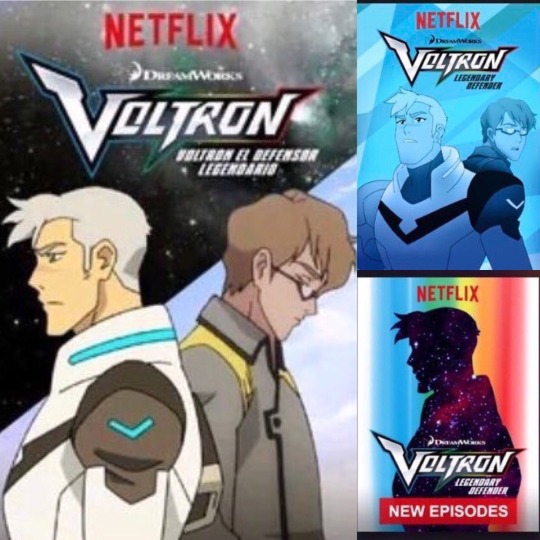
So uh.... Good morning.
So I think it’s pretty obvious by now that the reception to season 7 has been less than... good. The fan base has been shattered. People are upset, angry, and abandoning this series in droves (I’ve lost over 50 followers as I write this, just from people no longer wanting anything to do with this show) and have been incredibly vocal as to the reason why.
They killed Adam.
After two weeks of receiving praise for the relationship that was revealed at San Diego Comic Con, fans discovered on Friday night that Adam’s existence would be short lived, further contributing to this popular “Bury Your Gays” trope.
And I’ve seen people confused at this outcry. They don’t understand why people are so upset at this tiny side character’s death. What’s the big deal, right? It’s war! There’s supposed to be casualties!
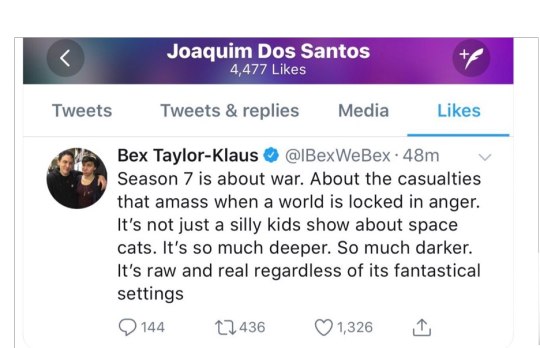
And to that kind of response I have to narrow my eyes and go:
“Oh.... maybe you understand the history of this.”
Because it is a history. A rich one. “Bury your gays” isn’t a trope in the same why that “Fake dating” is a trope. It’s not popular out of coincidence and I feel like many people are ignorant of that, which is FAIR! Because most voltron fans are young, most tumblr users are young, so I don’t expect you to be watching documentaries on LGBT+ cinema in between studying for your chemistry exams.
So that’s where I come in. Buckle in children as I take you on a journey on why the “Bury your gays” trope exists, and the harmful ramifications that it has had on the LGBT+ community since its inception.
So lets go back. Way back to the 1920′s when homosexuality, or at least homosexuality adjacent themes were seen on screen.

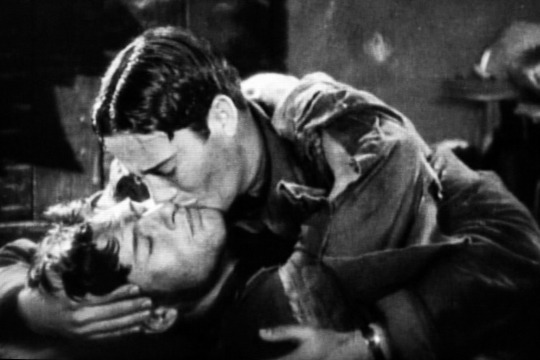
A time where a bro could kiss his bro, and it was seen as heart wrenching and realistic (Wings, 1927). A time where Marlene Dietrich could wear a suit better than a man, and flirt and kiss a lady just because she fucking could (Morocco, 1930). A time where gender roles were a bit looser, and there wouldn’t be an outcry over such imagery.
But as the great depression continued, and film producers became desperate to get butts in seats at the cinema, these LGBT+ themes became outright explicit. Raunchy even. Used for titillation and shock value.
“Have you seen that new picture, Doris? The one where the roman emperor has the hot male sex slave?? Mmmmm scandalous!”
But with this rise of LGBT+ characters and interactions used for shock value, also came the rise of public outcry. The catholic church (those debbie downers) started boycotting films. This lead to the formation of the PRODUCTION CODE, which is a fancy way to say THE CODE THAT WILL NOW CENSOR THE SHIT OUT OF YOUR FILMS in 1934.
Backed by catholic activists, the code made it impossible for LGBT+ representation to exist on film.
But did they?? See, this is actually were we start to see the development of “Queer coding”. Where actors and directors got savvy, and let you know a character was gay, whilst never explicitly stating so. It was subtle enough that it got past censors, but clear enough that audience members, especially LGBT+ people, got clued in.
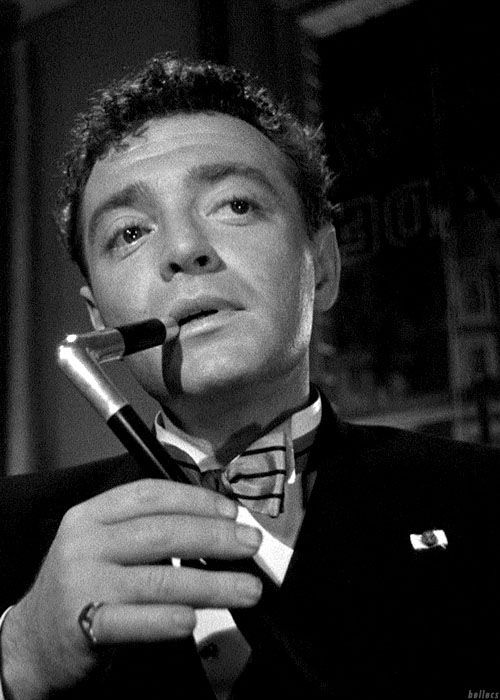
Yeah Peter Lorre, you put that phallus shaped object next to your mouth a lot. They’ll get what your implying, don’t you worry.
Oh, I’m sorry.... did i say you couldn’t have LGBT+ characters?? My mistake, you totally fucking could. Explicitly even.... if they were the villain. Religious people were totally cool if the villain in your film was LGBT+, because to them, that’s what LGBT+ people were.... villains.
Film’s like Rebecca, Dracula’s Daughter, and Alfred Hitchcock’s Rope all centre around truly horrifying and despicable villains... who are all gay. LGBT+ villains became such a staple in horror films during this time that it lead to a whole near character archetype! We have the damsel in distress, the heroic soldier, the wise old man, now welcome the rise of the:
PSYCHO QUEER.
Yikes.
But why I’m talking about this so much is because this popularity in LGBT+ villains is what creates the “Bury your Gays” trope.
Because the villains.... always die.
It’s their comeuppance. Their karma. Of course bad people will die and the heroes will go one to live a happy life! But what crime are we punishing these villains for?
The message these movies gets across to their audiences is that “If you are gay, you are a bad person... and bad people deserve to die”. Because Gay and villain were so synonymous with each other, they become one in the same, and as we all know by now REPRESENTATION MATTERS.
This influences how society views LGBT+ people, so that in 1952, when the PRODUCTION CODE of YOU BETTER NOT CONDONE ANYTHING SINFUL IN HERE BECAUSE JESUS DOESN’T LIKE THAT is torn down, things still don’t get much better for LGBT+ representation.
LGBT+ characters no longer have to be villains, but society is still not super cool with LGBT+ people, so now we get a new archetype: The self hating tragic gay character. And often? These characters kill themselves, such as in 1961′s The Children’s Hour. Because this is palatable to audiences who do not condone homosexuality in any way, but watching an LGBT+ struggle with themselves? Watching them become overwhelmed by guilt and hatred until they decide that death is the only way out? How tragic! How cursed they are! How pitiful! How... marketable.
But to see LGBT+ characters end up happy? Audiences at this time would not have stomached it, because to them, being LGBT was immoral and these characters were not deserving of happiness. A good analogy might be how modern audiences would view a film with a drug addict character in it. The addict either succumbs to their addiction and dies tragically, or they “Go straight” and have a happy ending. For these audiences in the 50s and 60s the only happy ending was a straight ending.
Then in 1969 we get the Stonewall Riots, and in the 1970s things actually look alright.
That is until the 1980s and society finds a new reason to hate, fear and vilify LGBT+ people. The AIDS crisis wipes out lives and almost all positive representation in the media. This fear is echoed in film as LGBT+ people become villains again. Sleepaway Camp and Cruising are such examples.
The 90′s are better. Whilst mainstream cinema is still vilifying LGBT+ in the 80s, more positive independent films still exist, and the success of the 1991 documentary Paris is Burning prompts Hollywood to go “Hey... maybe we can get some money if we pander to these LGBT+ folks”.
There is a brief period in the 90s where gay comedies like The Birdcage, In and Out, and To Wong Foo are allowed to exist. They’re comedies. The stereotypes are played for laughs, but there is a level of joy and care with these movies where even though these characters are making us laugh... for once we’re not laughing at them. We love these characters. We want them to succeed. No. One. Dies.
It smells like progress. Finally.
Or at least it would. Because these films also exist in the same decade that Philadelphia wins Oscars and the musical Rent is winning Tonys. Both of these deal with the tragedy of the AIDS crisis and have main characters die from the disease. Am I going to point out that Rent has four characters suffering from AIDS, but the only one to die is the Trans-coded poc gay man? Yes. Yes I am. Meanwhile the heterosexual couple suffering from AIDS gets a happy ending.
Interesting.
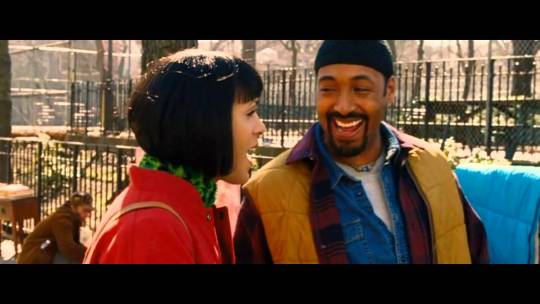
I hate you Rent. I hate you so goddamned much.
Also the 90s sees a good return to queer-coding villains. It’s always been there. It’s never really gone away, but I need to talk about the queer coding of 90′s villains because I’m sure all of you will actually recognise them.

Ah. There They are. Queer coding and Disney have a very rich history, which MANY articles have been written on. One might even say that it’s a... tale as old as time.
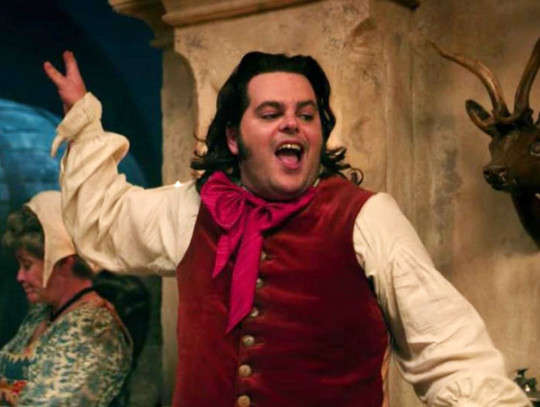
Mmmm no thank you.
But why it is so rampant, particularly in animated films, is because the films have a limited run time.
“We need to convince the audience that these characters are villains IMMEDIATELY. We don’t really have the time to waste on developing them and showing all their evil actions. We need audiences to believe when we tell them that these characters are bad. how do we do that?”
“.... make them kinda gay??”
That’s not actually how the conversation went in the board room, I’m sure, but it’s a very reduced down version. Because of the history of LGBT+ villains in the early years of cinema, animation relies on the stereotypes of villainous characters... well unfortunately those villains of old were LGBT+, so now we have LGBT+ stereotypes being passed on to new villains.
Anyway, my point is that almost all Disney villains die. Sorry that’s where I was going with this. Most of them die. The “Bury your Gays” trope is repeated here because of the villain’s queer coding. It’s not obvious, but the subtext is “Hey, if you’re a bit effeminate or do things outside of your strict gender role? Mmmmmm you deserve to die.”
“Bury your Gays” continues in modern media. Despite the importance of Brokeback Mountain, which explicitly shows a romance and intimacy between two men... Jake Gyllenhaal’s character still dies, and it’s implied that it may be due to a hate crime.
We see it in television. Buffy the Vampire Slayer, Downton Abbey, Arrow, there was a massive outcry over the trope in The 100 when a female character, after just entering an intimate relationship with another female character, is killed off seemingly senselessly.
The LGBT+ community is tired of only seeing themselves killed for shock value, character growth, or tragedy. Even Ru Paul’s Drag Race has come under fire in recent years for seemingly exploiting its contestants traumatic histories for ratings.
This is why this year’s Love, Simon was so important. The film portrays an adolescent gay character as he struggles with being open with his sexuality and finding a meaningful relationship. Simon is portrayed as a sympathetic character. He’s the hero.
And he gets a happy ending.
This is why Korrasami, a same-sex relationship in children’s media, is so important. It shows two girls achieving their happy ending together.
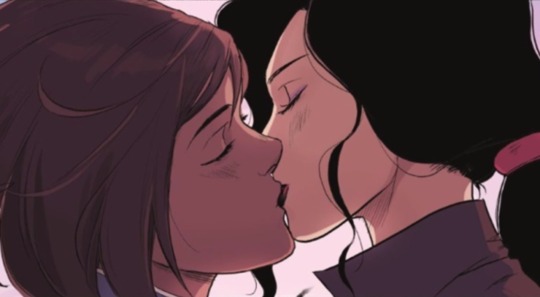
It’s why in the same year that Steven Universe portrays a same sex wedding, Adam’s death feels like such a step backwards.
The producers have stated that Adam’s death was supposed to raise the stakes of the season, it was supposed to make viewers realise the severity of the situation and overcome them with a feeling of loss, but Adam’s death doesn’t just fail the LGBT+ fans... it fails to effect viewers emotionally.
Because audiences can’t mourn a character that they have no connection with.
Most of Adam’s character was developed in interviews and not in the show, where he only spoke for one scene. The creators talked about the deep relationship between Adam and Shiro, but none of that is actually visible in the series. Taking the season at face value, Adam is just some guy who’s connected to Shiro that is killed off unceremoniously. He wasn’t even given the dignity of hero’s death, taking out even one enemy before he died. That’s what hurts the most.
His death is meaningless. It does nothing. It’s pointless.
But of course “There’s still Shiro, right?”, which is true. Shiro still exists and is confirmed a mlm, which is important, but it’s understandable why fans may not be satisfied with this. Let’s take a closer look at Shiro.
I often joke with my friends that Voltron should be renamed Shiro Suffers: The Series, because out of all the characters in the show, Shiro has definitely endured and been subjected to the worst (you could argue that Allura has, but Shiro has the joy of being tortured emotionally and physically, so I feel he wins).
The writers have tried to kill him numerous times, with only toy sales saving him. He’s been beaten, tortured, terminally ill, killed, revived, possessed and used... it’s a lot. In the old days, I used to ship shallura, not really out of feeling a real romantic connection between the characters, but just because I wanted Shiro to have someone. Someone to help support him. Someone he could open up about his struggles with. The paladins mean a lot to Shiro, but because he is their surrogate guardian, he cannot open up to them like this. He cannot show the paladins weakness, and we see this in how he keeps his disease a secret from Keith, because he does not want to burden Keith with his struggle.
The introduction of Adam wasn’t just exciting because of the potential of seeing a caring LGBT+ relationship, but because it gave fans hope that Shiro would have someone. There was the potential that Shiro might finally gain some kind of supportive relationship outside of his strict roles of “leader” and “guardian”.
Adam’s death removes that possibility. Despite how caring, generous, strong, intelligent, kind, patient and capable Shiro is written... his life is fucking awful. It’s very telling that in the final scene of the season, when every other paladin is in the hospital surrounded by their family and loved ones, Shiro is alone. He’s on a stage, giving a rousing speech to a crowd, still trapped in this role as an inspirational leader.
God, they don’t even let Shiro mourn Adam. Does he feel guilty that he was the one who supposed to die, whilst Adam lived, but now their roles are reversed?We’ll never know. Adam’s death doesn’t even give some insight into Shiro’s character. It’s truly pointless.
Season 7 of Voltron has made it clear that this is not a kids show. This is a serious show with dark themes. The writers want it to be taken more seriously.
Then I will critique it more seriously.
While I strongly doubt it was intentional, season 7 perpetuates the age old message “If you are LGBT+, you will not achieve a happy ending.” The “Bury your Gays” trope is steeped in a history of oppression, censorship, and vilification. When Adam dies, you’re not just seeing a character die, but you’re seeing the series make a conscious decision to participate in this oppressive trope. And it stings even more because the series sets two heterosexual relationships to potentially end in happiness, whilst the LGBT+ relationships have already ended in tragedy.
Why Adam? Why not literally anyone else? We had no connection to him, so it’s not like they could have used a handful of other characters for the same effect. (Kill James. Fuck that guy. And he’s young so it really would have hurt.)
And that’s what you have to question. This is why fans are upset.
I’m not writing this to convince anyone to boycott the show, or plead with you to stop watching. That’s up to you and your own belief system. I definitely do not condone harassing the writers or voice actors.
I just want people to understand why fans are so upset over season 7, and that they have every right to be. To state that the outcry is just because “fans didn’t see their ships become canon” is dismissive and cruel. Adam and Shiro’s relationship was heavily used in marketing by Netflix, so much so that you could call it queer-baiting. It was hyped at SDCC and explained as this deep and meaningful relationship, whilst the producers knew what Adam’s fate would be the whole time.
I know producers have to answer to higher ups. I know the crew were largely on edge about what would get approved and what would not.
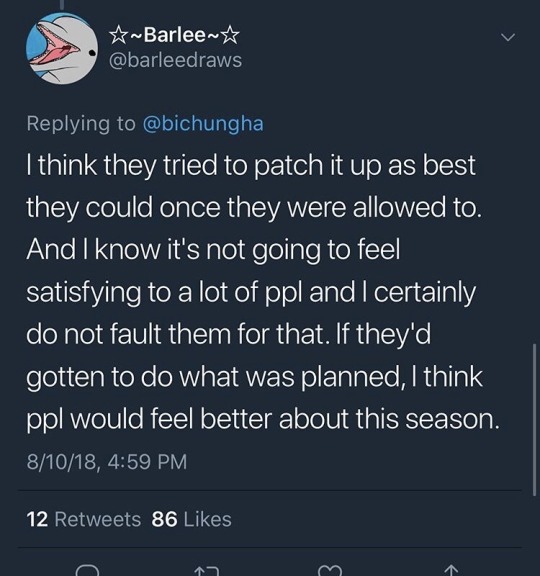
But the point remains... they still made this conscious choice. Fans don’t have to be happy about it. They shouldn’t be.
I have no idea what season 8 will bring, and at this point I feel like it might be a mess. But I encourage fans to support each other and be vocal about why you’re upset. You can’t change this show, but there’s hope that another series could learn from this.
History repeats. Until we don’t let it.
#voltron#vld#voltron spoilers#adashi#shadam#discourse#negativity#q slur#takashi shirogane#this took a while
33K notes
·
View notes
Text
Maplecroft by Cherie Priest

Maplecroft on Goodreads
Genres: Historical Fantasy, Horror (Lovecraftian)
LGBT Rep: Lesbian/wlw main and minor character (in a romantic relationship with each other)
Spoiler-Free Review:
Well, this is embarrassing. This book is a reread for me, and I picked it out because I remember liking it a lot, and I thought that it was a book that people probably didn’t know about. But reading again...it didn’t end how I remembered it ending. There’s one (very spoilerific) thing that is very different from how I remember it happening. I’ll get into more details for a spoiler review under the cut, but just know this difference might hinder my ability to recommend the book to everyone.
Synopsis: The premise of the book is Lizzie Borden vs. Cthulhu monsters. Lizzie Borden (yes, the alleged axe murderer Lizzie Borden) kills Lovecraftian monsters with her axe. It’s a very good premise and in the book Lizzie is gay! Actually, in real life she was very likely gay, and very likely had a romantic relationship with Nance O’Neil, a stage and silent movie actress. In this book, Lizzie and Nance are blatantly dating each other. It’s not just hinted at; it exists outright. Nance is referred to as Lizzie’s lover by her and actually by other characters too. Lesbian or other terms are never used, because it takes place from the point of view of characters from the early 20th century, and that kind of language didn’t exist, but their queer identities are made obvious.
The Good: One thing I found actually refreshing is that when other characters did acknowledge Lizzie and Nance’s relationship, the worst it got was them just saying they wouldn’t comment on it. There were no direct implications that they’re doing anything morally wrong, or that their relationship says something negatively about their characters. Nance does have an antagonistic relationship with Lizzie’s sister Emma, but its not because she’s Lizzie’s girlfriend. It’s because she’s Nance O’Neil, and that does reflect historical events to some extent.
What Might Hinder You from Reading It: One thing that might be an issue for some people, but wouldn’t necessarily deter me from recommending it, is that there’s a lot of angst in this book involving the relationship between Lizzie and Nance. The angst has nothing to do with the fact that they’re both women, but there’s angst there for sure, and I understand people not eager to read angst-filled f/f romance, because it’s too common. To explain more would involve spoilers, which I’ll get into after the cut in case anyone wants to avoid that.
How the angst-filled relationship concludes also might not be satisfying, so I’m not going to recommend it outright, but I’m also not going to say don’t read it. How I feel about it is actually complicated. I will say that how it ended was not exactly for I remember, and it’s a bit of an issue for me right now. If you don’t care about spoilers, follow under the page cut for further explanation.
Also, just be aware that though this book is fantastical, it is definitely also a horror. It’s actually more of a horror with fantasy elements than the other way around.
Would I Recommend It?: Eh... I’m not sure. It really depends on the person and what they’re able/willing to tolerate.
Now for the Spoilers:
So the thing about this book is that there’s a large part towards the end where you think Nance O’Neil, one half of the lesbian couple, is dead. The characters do, at least. I had remembered that being concluded with them all knowing that she was alive, but her and Lizzie’s relationship ending. However, they apparently never find out if she’s alive or dead. Not only that, the book itself never clarifies if she’s alive or dead, which I could have sworn it did.
But the thing is that Nance O’Neil is a real person with a documented history with Lizzie Borden. The book takes place in 1905, but the real-life Nance O’Neil did not die in 1905. The woman has over 30 credits on IMDB (yes she has an IMDB) throughout the 1910s-1930s. So I may have been projected the fact that I knew Nance O’Neil didn’t die with the book clarifying that she didn’t. Is it technically Bury your Gays if you know that the real-life person didn’t die in the events of the book that says that she disappeared without a trace and was assumed dead? I don’t know, but it’s too close for comfort with me right now. It’s certainly places with the Bury your Gays trope, which I obviously have an issue with. I can’t in good comfort recommend it based on that.
And regardless of whether or not Nance dies, her relationship with Lizzie is definitely over at the end, which is true to history, but might be a deterrent. If you want a happy ending, this isn’t your book. I had thought that I could recommend this as a book that at least didn’t kill off one of the lesbians, but apparently I can’t!
So as an apology for that, here’s a link to a photoset I made for all my favorite pictures of Nance O’Neil, who constantly looks like she knows exactly who killed Lizzie Borden’s parents and she is not telling.
#booklr#queer books#lgbt books#lesbian books#sapphic books#lgbt book reviews#queer book reviews#maplecroft
18 notes
·
View notes
Text
The Sound of Music
Summary: http://www.en.wikipedia.org/wiki/The_Sound_of_Music_(film)#Plot
Thoughts:
Before we start, this is the first time I’ve watched this since Charmian Carr’s death, so:
Rest in peace Charmian Carr. You were a wonderful Liesl.
While I admit it's pretty, the beginning of this movie has always bored me.
I wonder how I would react to this movie if it was the first time I was seeing it.
So I got curious as to what order the nuns belong to, so I looked up Nonnberg Abbey. Apparently they're Benedictine.
"Some people would call that honesty." I love the Reverend Mother.
I'm with Maria. Seven children is a lot. Not Duggar-levels of crazy by any means, but damn.
"I have always longed for adventure" Then WHY THE FUCK are you trying to become a nun?
Before I understood how musicals worked, I always thought of how annoying it must be to be on a bus with someone who was singing. Loudly.
You know, I never thought about it, but what does Captain von Trapp do all day when he’s not off in Vienna?
If the children have had twelve governesses in a few years (since Gretl’s only 5) that means that something’s wrong with the children, dude. Like, for instance, they’re little hellbeasts.
I didn’t realise when I was younger how much of a little shit Maria is. And I love her for it.
Well she just showed her soft underbelly…
I will never stop wondering how the fuck that frog got into her pocket without her noticing until then. Or how one of the children managed to keep a frog a secret during the introductions
Liesl, you are so not subtle. Why do you think your father had them lock the doors earlier than usual?
I don’t know if there was ever a time I was ever anything but meh about this scene. Maria/Georg was always my ship of choice.
I just realized that we do not see Frau Schmidt at all after this scene in Maria’s bedroom.
Okay, I could understand Gretl, Marta, and maybe Brigitta (and that one’s a stretch) being scared of the thunderstorm. But Kurt, Friedrich, and Louisa? Not a chance. Louisa and Friedrich are teenagers, and Kurt, even if he were scared, wouldn’t want to show it.
I get that it was a plot device. That doesn’t mean it wasn’t a stupid one.
I love how they had Marta and Gretl – the former in particular – rush to make sure they were close to Maria. They’re the ones least likely to remember anything about their mother, plus they’re rather young, so they’d be the ones to latch on to the first person to show them affection.
This song, like “Supercalifragilisticexpialidocious,” just makes me smile.
“Only during thunderstorms, sir.” I love Maria.
I wonder how long it took to sew those clothes, and what Maria and the children did in the meantime. It also does suggest a long absence on the Captain’s part.
With their father being gone all the time and them going through governesses like tissue paper, I’d imagine that Liesl was a second mother to Marta and Gretl.
I’ve noticed that in the Do Re Mi number Gretl’s constantly trying to catch up to the other children. The poor kid has such short legs a lot of times she can’t even get somewhere to do the choreography before she has to go somewhere else.
I’m glad they had the older children (Liesl-Kurt) do most of the jumping up/down stairs. They’d be more likely to keep their balance.
I think they do set up pretty well that, at least before he reconnects with his children, Georg and Elsa are pretty well suited for each other.
When I was little, I didn’t know why Georg and Elsa needed a chaperone, since they were adults. I get it now.
Rolfe’s kind of an idiot. Oh, just gonna ride up and start throwing pebbles at the window, not even check to see if there’s anyone there. Which there very clearly was.
Oh that was about the worst person you could have said “Heil Hitler” to
“What’s going to happen’s going to happen. Just make sure it doesn’t happen to you.” That makes me cringe more than it used to. For...reasons.
The Baroness looks more amused than annoyed at the children talking over one another after they fall in the lake. While I don’t appreciate her boarding school comment later in the film, she at least doesn’t have the “new stepmother hating the children” cliché.
Say what you will about the Baroness, she knows how to pick up on social cues and get the hell out of there before the yelling starts
“Mmhmm, and having a marvelous time.” I love this little shit.
“The little ones just want to be loved.” That is just sad. And it explains how quickly and fiercely they took to Maria.
I do not like the puppet scene. I’m not exactly sure why.
The VHS version I grew up with was full screen, so when Maria first tries to hand Georg the guitar I only saw her arms. They’re nice arms and everything, but still.
I love this song. It’s one of my favorite songs in the movie. It helps that the Captain and Maria are making goo-goo eyes at each other.
I could play the Landler dance over and over
I don’t really like the Baroness’s dress. It’s the color. And how fucking shiny it is.
I like how they kept the “Brigitta notices everything” thing. Like it wasn’t just a one-off comment. She’s the one who comments on Maria’s blushing, and you can see her watching the interactions between Maria, the Captain, and the Baroness.
Apparently Nicholas Hammond had to go through numerous painful dye jobs to get the blond hair Friedrich has. And I will never stop wondering why. Liesl, Brigitta and Marta all have dark hair. Hell, the Captain has dark hair. The gene for dark hair is dominant. He could have kept his brown hair and no one would have cared.
“If the Nazis take over Austria, I have no doubt, Herr Zeller, that you will be the entire trumpet section.” It took me a while to understand that particular insult.
“How clumsy of me. I meant to accuse you.” Herr Zeller’s gonna need a lot of ice after that one.
I used to really hate the Baroness for interfering with the Captain and Maria. Now, I realize that she probably cares a great deal for the Captain, and may even love him. The Captain called her his savior. She brought meaning back into his life. That’s a big thing. And then a younger woman comes in and starts to ruin it. Like I still don’t like her much, but I kind of understand where she’s coming from. It’s mean and underhanded, but not crazy or supervillainy
You know, Maria might have just gone back to the Abbey in September without the Baroness saying anything. I think she was in denial about being in love with the Captain, and probably would have stayed that way. The Reverend Mother notices something because A) Maria came back early, B) she’s in seclusion and C) the von Trapp children clearly adore her. Now maybe she would have noticed something anyway, but the Baroness pushed things along. Whoops.
“He’ll get over it soon enough I should think. Men do, you know.” Yep, didn’t get this one as a child either.
Yeah this was a really shitty thing to do. She probably didn’t want anyone trying/probably succeeding in getting her to stay, but still, shitty thing to do. The poor kids.
I give the Baroness a bit of credit for at least trying to bond with the children.
Yeah the boarding school thing is where she loses major points. And I’m a bit peeved that Max is cool about it.
And this will be imitated by all catty – usually blonde – future stepmothers and their (usually stereotypically) gay best friend. And it will never be done as well. Because the Baroness is not a terrible person. She cares about Georg and at least tries to bond with the children. And seven children is a lot, even Maria said so. And she bows out gracefully when it’s clear she’s lost. Most of her imitators don’t seem to have any of that going for them.
Yeah idk if Max is or was even coded to be gay. But it wouldn’t surprise me.
And that’s probably why the boarding school thing bugs me so much. Because it’s usually gold-digging, conniving, horrible women who don’t actually care about their fiancé or the children (and usually have to deal with fewer anyway) who say it.
I’ve read the Captain’s nonchalance as put on, given how he reacts when Maria comes back.
I wonder how long it’s been since Maria left. Probably not more than a few days. Yeah, Georg proposed rather…quickly then.
OMG MAX’S FACE when all the children are kissing the Baroness.
The Reverend mother was about to straight up cut a bitch when she though the von Trapps were unkind to Maria
I fucking love the Reverend Mother.
“It’s been so cold lately they turned blue.” What the fuck, Friedrich?
I’m pretty sure he knows exactly where they were.
Yeah, a villa in the south of France would not do well in a couple of years. Vichy France and all.
Well at least he’s being honest and ending it before it gets too far gone.
Yeah even when I was a kid I was like why are you singing, you could be doing better things.
Okay, I can understand Georg and the pinecone thing, but Maria and the whistle is bullshit.
That veil is long.
Holy tonal shift. But yeah, I get kinda bored after the Nazis show up. I did not come here for Nazis.
I kind of love that Frau Schmidt was like “fuck you” to the Nazis. Not directly, but still.
Yeah, a month is a really long honeymoon. They’ve got to be getting a bit sore by now…
And I want you to know that I felt very weird typing that about a movie I first saw when I was like five
“Maybe the flag with the black spider on it makes people nervous.” The flag with the black spider on it makes people very nervous.
It will never not bug me that they got Brigitta’s and Kurt’s names switched on the program, order-wise.
“We make it our business to know everything about everyone.” That’s…horrifying.
YAS CAPTAIN VON TRAPP RIPPING THE NAZI FLAG.
"And you belong to him…” I know this is the 1960s being the 1930s, but…yuck.
I’m kinda wondering how Georg and Maria managed to learn their festival singing parts so quickly.
I’d say it was stupid for them to go to the Abbey, as that’s the first place the Nazis would look, but they didn’t really have anywhere else to go.
"It’s you we want, not them.” Bullshit. You don’t think the Nazis would hold his family hostage to make sure he did what he was told?
“You’ll never be one of them.” So not the right thing to say.
“Reverend Mother, I have sinned.” “I too, Reverend Mother.” I love this part.
Somehow, I think this is a sin that God could live with.
Fun fact: the real von Trapps escaped via train to Italy, then London, then got to the US. I think they settled in Vermont. Walking over the Alps would most likely get them to Germany, not Switzerland.
Fun Stuff:
Should I Actually Watch This? (especially for movies that are considered “Classics”)
I recommend it. I mean, if you don’t like movie musicals, you probably won’t like it, because there’s a metric shit ton of songs, and it is a bit sweet and sentimental, so there’s that. But it’s a damn good movie.
Biggest Plot Contrivance:
The thunderstorm. They aren’t gonna convince me that all of the older children are scared of thunderstorms.
Biggest WTF Adaptation Change:
Having them escape via train and ship would have been plenty dramatic and wouldn’t have ended them up in Germany.
Favorite Character:
Maria. She’s compassionate and kind but not afraid to call people on their BS.
Biggest Shithead:
Herr Zeller. Rolf is a very close second.
Favorite Song:
“My Favorite Things.” “Edelweiss” is a close second.
Least Favorite Song:
The Lonely Goatherd. No question. That scene is just not one of my favorites.
2 notes
·
View notes